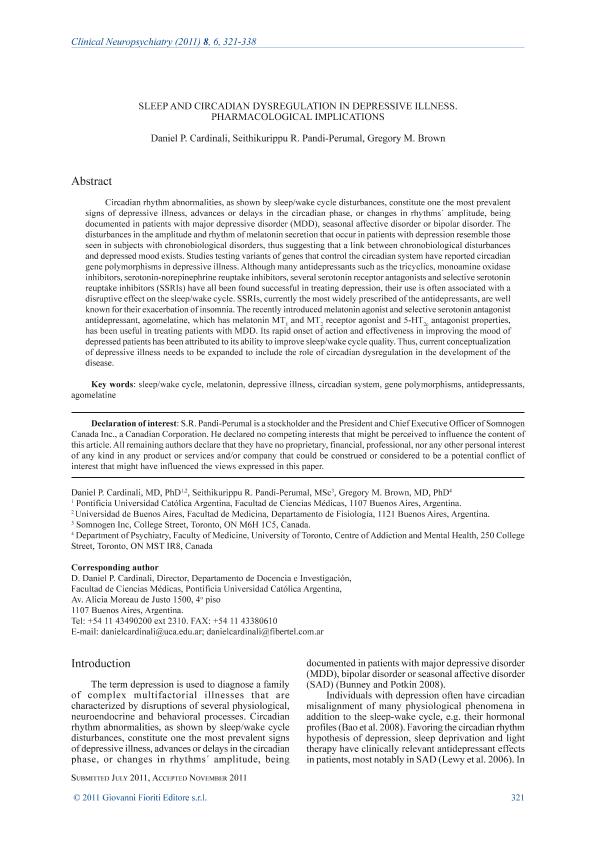Mostrar el registro sencillo del ítem
dc.contributor.author
Cardinali, Daniel Pedro

dc.contributor.author
Pandi Perumal, Seithikurippu R.

dc.contributor.author
Brown, Gregory M.

dc.date.available
2023-04-19T10:43:52Z
dc.date.issued
2011-12
dc.identifier.citation
Cardinali, Daniel Pedro; Pandi Perumal, Seithikurippu R.; Brown, Gregory M.; Sleep and circadian dysregulation in depressive illness. Pharmacological implications.; Giovanni Fioriti; Clinical Neuropsychiatry; 8; 6; 12-2011; 321-338
dc.identifier.issn
1724-4935
dc.identifier.uri
http://hdl.handle.net/11336/194457
dc.description.abstract
Circadian rhythm abnormalities, as shown by sleep/wake cycle disturbances, constitute one the most prevalent signs of depressive illness, advances or delays in the circadian phase, or changes in rhythms´ amplitude, being documented in patients with major depressive disorder (MDD), seasonal affective disorder or bipolar disorder. The disturbances in the amplitude and rhythm of melatonin secretion that occur in patients with depression resemble those seen in subjects with chronobiological disorders, thus suggesting that a link between chronobiological disturbances and depressed mood exists. Studies testing variants of genes that control the circadian system have reported circadian gene polymorphisms in depressive illness. Although many antidepressants such as the tricyclics, monoamine oxidase inhibitors, serotonin-norepinephrine reuptake inhibitors, several serotonin receptor antagonists and selective serotonin reuptake inhibitors (SSRIs) have all been found successful in treating depression, their use is often associated with a disruptive effect on the sleep/wake cycle. SSRIs, currently the most widely prescribed of the antidepressants, are well known for their exacerbation of insomnia. The recently introduced melatonin agonist and selective serotonin antagonist antidepressant, agomelatine, which has melatonin MT1 and MT2 receptor agonist and 5-HT2c antagonist properties, has been useful in treating patients with MDD. Its rapid onset of action and effectiveness in improving the mood of depressed patients has been attributed to its ability to improve sleep/wake cycle quality. Thus, current conceptualization of depressive illness needs to be expanded to include the role of circadian dysregulation in the development of the disease.
dc.format
application/pdf
dc.language.iso
eng
dc.publisher
Giovanni Fioriti
dc.rights
info:eu-repo/semantics/openAccess
dc.rights.uri
https://creativecommons.org/licenses/by-nc-sa/2.5/ar/
dc.subject
DEPRESION
dc.subject
SUEÑO
dc.subject
RITIMOS CIRCADIANOS
dc.subject.classification
Otros Tópicos Biológicos

dc.subject.classification
Ciencias Biológicas

dc.subject.classification
CIENCIAS NATURALES Y EXACTAS

dc.title
Sleep and circadian dysregulation in depressive illness. Pharmacological implications.
dc.type
info:eu-repo/semantics/article
dc.type
info:ar-repo/semantics/artículo
dc.type
info:eu-repo/semantics/publishedVersion
dc.date.updated
2023-04-18T13:09:59Z
dc.journal.volume
8
dc.journal.number
6
dc.journal.pagination
321-338
dc.journal.pais
Italia

dc.journal.ciudad
Roma
dc.description.fil
Fil: Cardinali, Daniel Pedro. Pontificia Universidad Católica Argentina "Santa María de los Buenos Aires". Facultad de Ciencias Médicas; Argentina. Consejo Nacional de Investigaciones Científicas y Técnicas; Argentina
dc.description.fil
Fil: Pandi Perumal, Seithikurippu R.. No especifíca;
dc.description.fil
Fil: Brown, Gregory M.. No especifíca;
dc.journal.title
Clinical Neuropsychiatry
dc.relation.alternativeid
info:eu-repo/semantics/altIdentifier/url/https://www.clinicalneuropsychiatry.org/download/sleep-and-circadian-dysregulation-in-depressive-illness-pharmacological-implications/
Archivos asociados
